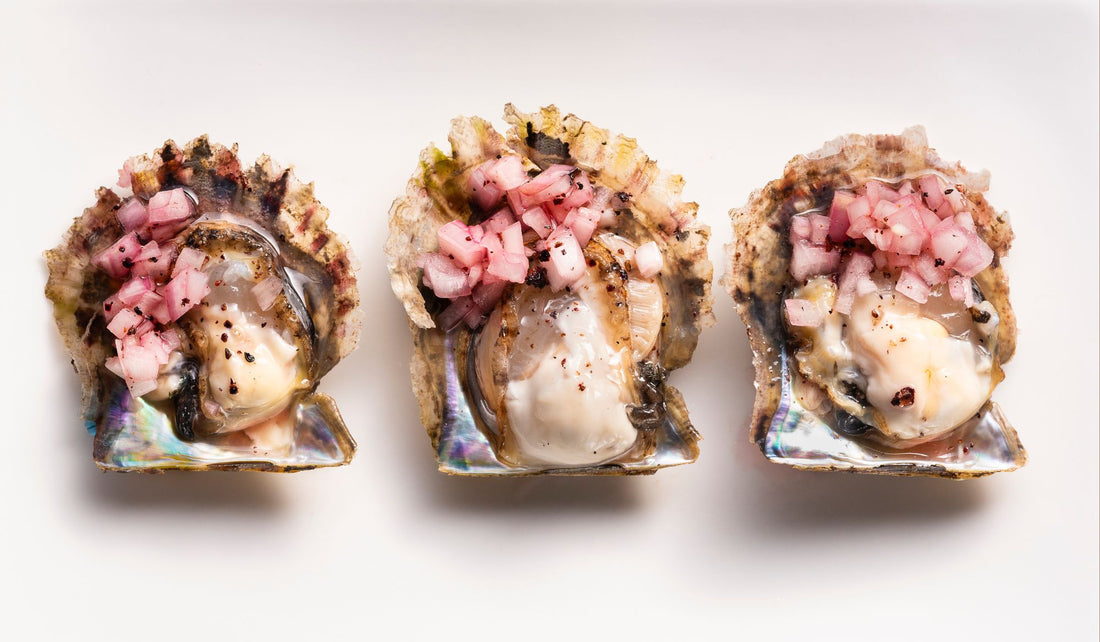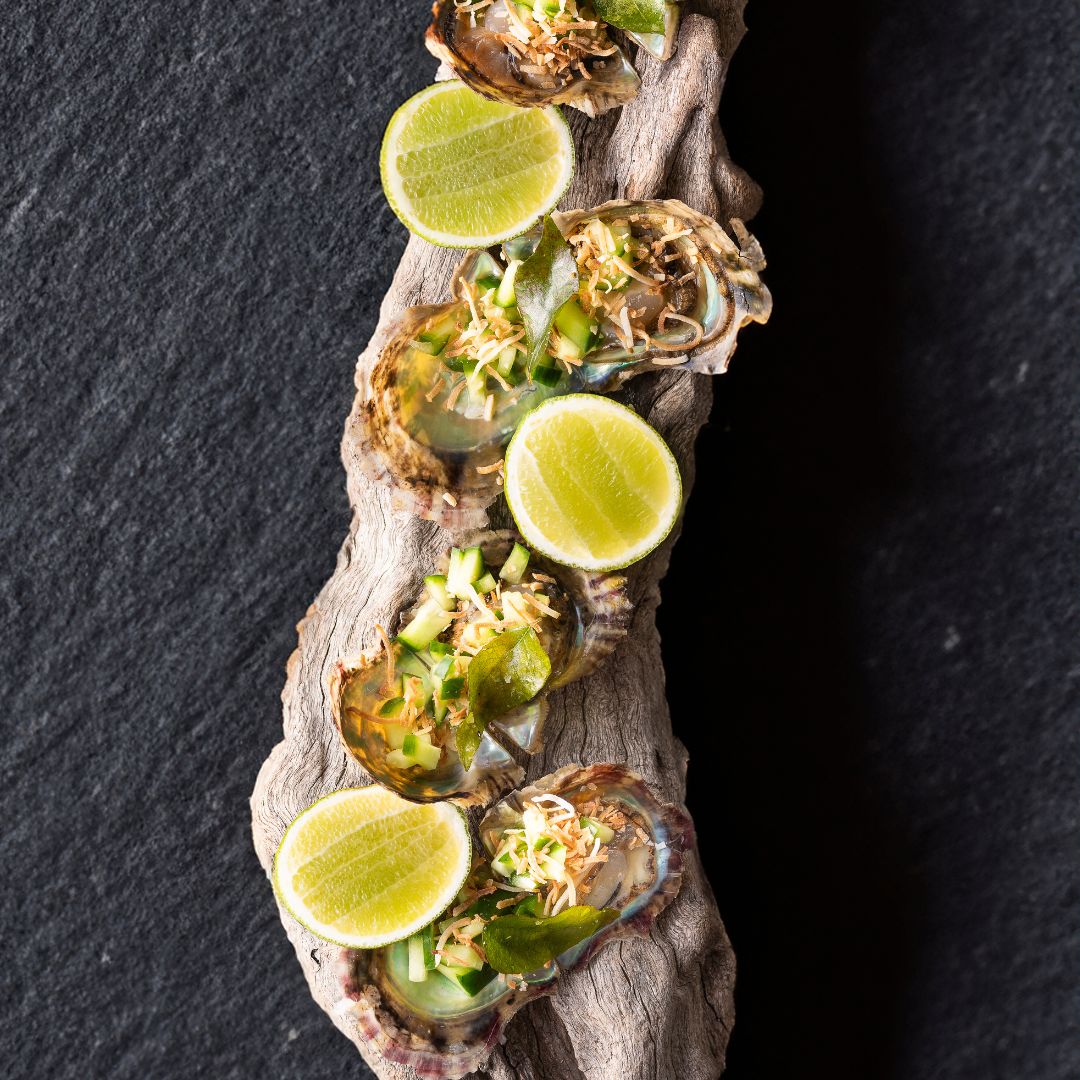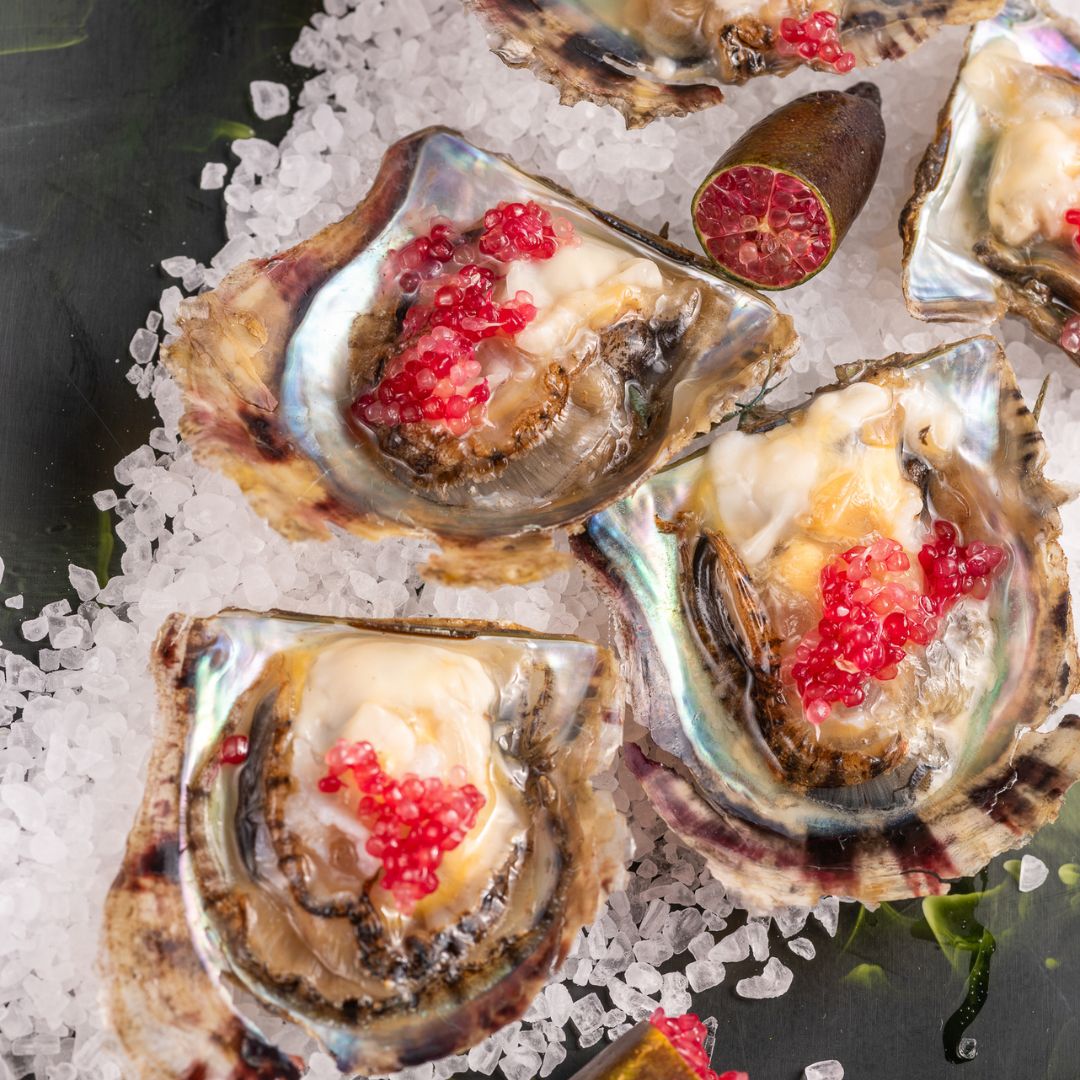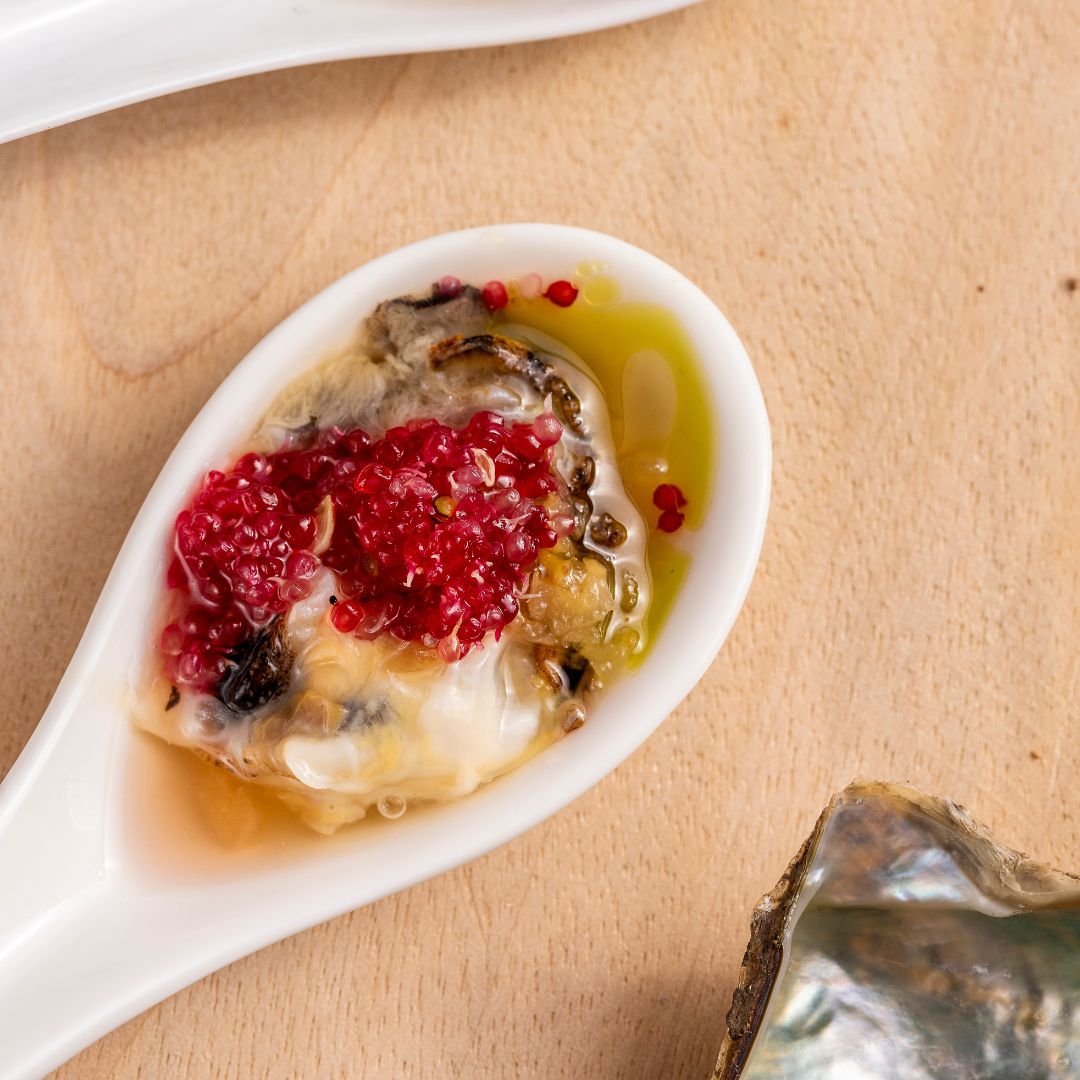

PRESS RELEASE
Public Release Date: March 19 2024
A first for NSW – recently certified edible pearl oyster set to hit the domestic market.
A new aquaculture industry emerges from Sydney Rock Oyster heartland.
Limited availability through a hand-selected network of NSW premium dining restaurants including Saddles at Mt White.
It may come as a surprise to learn that in the waters just north of Sydney, a native species of pearl oyster has been quietly growing some of the world’s finest Akoya pearls for the past twenty years. Adding to this remarkable story is the fact that another rare treat from these oysters will soon be available as a new seafood delicacy – the Broken Bay Akoya pearl oyster.
With its NSW operations at the Broken Bay Pearl Farm, Pearls of Australia is all about creating immersive customer experiences. It presents a new pearling business model which incorporates tourism, education, and now – taste experiences in NSW. It is the final pieces of a plan that has taken the last five years to develop, and suffered a major setback three years ago when the Hawkesbury River suffered catastrophic flooding and fresh water pollution which decimated the Akoya pearl oysters at the time.
Though in a story of triumph, the Broken Bay Pearl Farm has bounced back and is now ready to introduce their local Akoya pearl oysters to the seafood and restaurant industry.
Nestled in historic oyster farming heartland, Broken Bay Pearl Farm operates in the waters of both the Brisbane Water and the lower Hawkesbury River. The farm has recently received the news that has been years in the making, with the final approvals now in place to sell Pinctada fucata (Akoya) pearl oysters as an entirely new seafood product to the market.
Farming of Broken Bay Akoyas is underway; however, supply will be very limited initially as Broken Bay Pearl Farm work towards rapid expansion to meet a predicted uptake in demand. The company’s operational headquarters at Mooney Mooney – the Shellar Door – is already open to the public for an array of pearling experiences.
Just like a Sydney Rock Oyster, Broken Bay Akoya can be eaten raw and whole. With a flavour profile all of its own, it has been described as stronger than the very subtle ‘Pearl Meat’* (from Broome) and expressing the more typical briny flavours from the sea that oysters are famous for.
Oyster enthusiasts should not be expecting to munch on an additional valuable treat (a cultured pearl), as Broken Bay Akoya will be farmed separately for pearls and seafood. Unlike the Sydney Rock Oyster, the mother-of-pearl on the inside of the shell is luminescent, radiating iridescent colours.
Company owner, James Brown is a third-generation pearl farmer who places extremely high value on sustainability and authenticity – two key values of the Pearls of Australia brand and Broken Bay Pearl Farm.
“Bringing this new seafood product to market enhanced both of these core aspects of our business” said James. “Oyster farming is now widely recognised as not just sustainable but truly regenerative in its effect on the surrounding environment and our pearl oyster farming is just an extension of that. This will allow us to continue to grow our NSW pearl farms, contributing positive restorative ecosystem services to the surrounding marine environment, and new jobs to the area.”
Working very closely with the NSW Food Authority and the Department of Primary Industries, James is certain that “without such great support, this new product may still not be available for a long time yet.”
Early signs from industry are very encouraging with an influx of businesses expressing their interest to be amongst the first to serve this local native edible oyster. Broken Bay Pearl Farm will work with a select number of established restaurants and acclaimed chefs who share the excitement to have an entirely new seafood product on their menus.
The first restaurant to serve the Akoya pearl oyster is Saddles at Mt White, the John Singleton owned restaurant on the NSW Central Coast – only a ten minute drive from the Broken Bay Pearl Farm. Saddles’ Head Chef, Kodi Southgate, has been creating new dishes for the restaurant which accentuate the taste and texture of this new delicacy.
“It’s exciting to work with the Akoya pearl oyster, which is a relatively new food item in NSW, and lucky for us – found locally. The Akoya has a rather intriguing taste, with the creamy finish of a Sydney Rock oyster but the texture more like a mussel, so you basically get the best of both worlds when consuming this oyster,” said Kodi.
- END -
MEDIA CONTACT
Sales Enquiries
About Broken Bay Pearl Farm
Established in 2003, Broken Bay Pearl Farm is the only pearl producer in NSW and has remained a strong boutique pearling operation since. In 2018 Broken Bay Pearl Farm joined forces with Cygnet Bay Pearl Farm (WA), forming Pearls of Australia – a new partnership to cultivate and promote the provenance and purity of two native species of Australian pearls, from east to west.
Broken Bay Pearl Farm has developed the expertise to cultivate the highest grade of ‘Akoya’ pearl in the world, fetching a premium due to its longer cultivation periods and the stand-out features of extremely high lustre and an exciting array of natural colours.
About Pearls of Australia
Pearls of Australia owns and operates two pearl farms:
- Broken Bay Pearl Farm on the Central Coast NSW which grows Akoya pearls (Pinctada fucata) – Australia’s newest pearling area
- Cygnet Bay Pearl Farm just north of Broome, WA which grows South Sea pearls (Pinctada maxima) and is Australia’s original family-owned pearling enterprise, established 75 years ago.
Now in its third generation, this family run business is the only enterprise in the country to cultivate and market both species of native Australian pearl shell from east to west.
Pearls of Australia is all about creating a new customer experience through an exciting new business model which incorporates tourism, education and now taste experiences in NSW through Broken Bay Pearl Farm. It is the final pieces of a plan that has taken the last three years to develop.
Through both pearl farms in WA and NSW, Pearls of Australia offers visitors the opportunity to immerse themselves in a working pearl farm, to see first-hand, how pearl quality is judged, as well as being able to purchase certified premium pearls from the farm. They now bring an exciting initiative with an entirely new seafood delicacy to the market – the Broken Bay Akoya Pearl Oyster.
Pearls of Australia and Broken Bay Pearl’s core values around sustainability, environmental responsibility and a conscious and ethical approach to business have been evident throughout its approach to pearling, pearl retail and tourism. The company aim to continue this ethos through to its new seafood product.
*Australian Pearls and ‘(Broome) Pearl Meat’
Australia is well known as a leader in pearl cultivation, with the giant Pinctada maxima – native to Australia’s northern tropical waters including Pearls of Australia’s Cygnet Bay operation in Western Australia – producing the largest, most valuable pearls on the global market. The lesser known subtropical pearl shell species that grows north of Sydney is also found in Japan and was used by Mikimoto to produce the original cultured pearl, commonly known as Akoya pearls.
The pearl industry seafood presently on the market known as ‘Pearl Meat’ refers to the adductor muscle (like a scallop) of the large P.maxima and has been harvested from Broome as a bi-product since the turn of the century. Extremely rare and highly prized, pearl meat is sold for $100 to $150 per kg, which is why most Australians are not used to seeing it on restaurant menus. It differs from the Broken Bay Akoya, as it’s only one part of the oyster (the adductor muscle), not the whole oyster, and it is harvested from a shell that is five to ten times the size of NSW’s P. fucata.
Pearl oysters have provided a living for coastal people around the world for thousands of years. They were traditionally fished for mother of pearl shell, and more recently farmed for pearl culture. The larger pearl shell has great commercial value as a textile (mother of pearl) used primarily for buttons. Due to the presence of many culturally significant shell middens around the waterways of the Hawkesbury and Central Coast, we know that Broken Bay pearl oysters are likely to have formed part of a broad range shellfish diet for local Aboriginal people.


